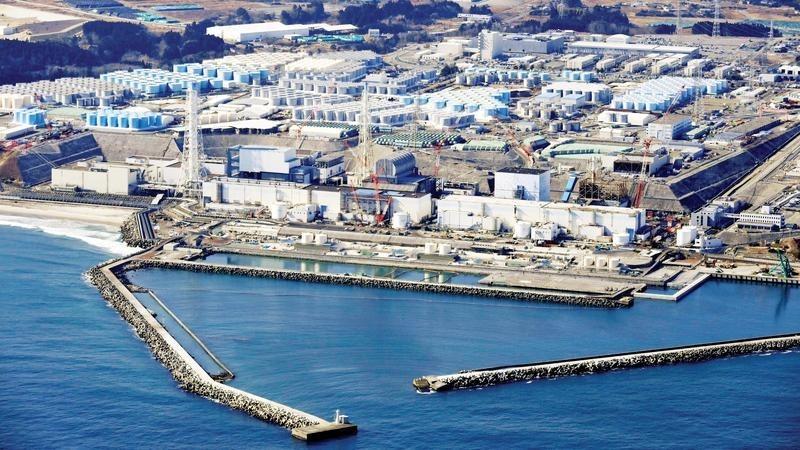 Storage tanks hold treated water at the Fukushima Daiichi nuclear power plant in Okuma, Fukushima prefecture, Japan, as seen on April 13, 2021. (PHOTO / KYODO NEWS VIA AP)
Storage tanks hold treated water at the Fukushima Daiichi nuclear power plant in Okuma, Fukushima prefecture, Japan, as seen on April 13, 2021. (PHOTO / KYODO NEWS VIA AP)
Fishery organizations and consumer rights and environmentalist groups in the Philippines have reiterated opposition to Japan’s plan to dump 1.25 million tons of radioactive wastewater into the sea, warning that Tokyo’s move threatens food security and human health as well as the livelihood of millions of fisherfolk.
Participating in a forum held in Manila on June 19, leaders of these groups urged the Philippine government, which is yet to issue a statement on Japan’s planned discharge from the crippled Fukushima nuclear power plant, to join other nations in demanding a halt to ocean contamination.
Veronica Cabe, coordinator of the Nuclear and Coal-Free Bataan Movement, has urged the Philippine government to join other Pacific Island countries in demanding that the Japanese government and TEPCO stop the plan to discharge contaminated water into the ocean and make TEPCO accountable for its waste
At the hybrid forum, which was organized and moderated by Wilson Lee Flores, a business leader and newspaper columnist, participants expressed solidarity with other fisherfolk and civic organizations opposing Japan’s plan, noting that the plan can only be stopped through a united front.
On June 12, Tokyo Electric Power Company (TEPCO), operator of the Fukushima Daiichi nuclear power plant, started testing the equipment to discharge the wastewater from the plant into the Pacific. This came despite ongoing opposition from experts, civic groups, and fishery organizations in Japan, South Korea and Pacific Island countries.
ALSO READ: Fukushima plan a nuclear threat to Asia-Pacific
Veronica Cabe, coordinator of the Nuclear and Coal-Free Bataan Movement, has urged the Philippine government to join other Pacific Island countries in demanding that the Japanese government and TEPCO stop the plan to discharge contaminated water into the ocean and make TEPCO accountable for its waste. Cabe said that polluting the Pacific Ocean will harm future generations.
“We belong to one Pacific Ocean. We are all fisherfolks and fish is our main source of protein,” she said.
Ronnel Arambulo, national spokesperson of the Federation of Small Fisherfolk Organizations in the Philippines, said the contamination of the Pacific Ocean will not only destroy the Philippines’ rich marine resources but will displace small fisherfolk who depend on the ocean for their livelihood.
What happened in Fukushima may also serve as a warning to the Philippine government which is planning to develop nuclear power as an alternative source of energy, he said.
ALSO READ: Japan sends seawater into tunnel for Fukushima water discharge
Pablo Rosales, national chairperson of the Coalition of Fishermen’s Associations, said it is the fisherfolks’ responsibility to ensure that marine resources are protected to provide sustainable food supply to all people.
“We are not just fishing for our family but for the people. They need fish as a source of protein,” Rosales said.
Noting that the Philippines is already facing problems with overfishing, Rosales urged the government and the Filipino people to stop the planned disposal of the toxic wastewater.
Since Japan had decided to use nuclear power, it should act responsibly and find a way to dispose nuclear waste properly without adversely affecting fisherfolk and the marine environment, he said.
The Philippines is an archipelago made up of 7,107 islands and its maritime domain has made the fishery sector one of the nation’s key industries. The Philippines is one of the world’s biggest fish producers and its fishing and aquaculture industry employs about 2 million Filipinos.
READ MORE: Better safe than sorry with Fukushima water
Fish, like rice, is a staple in the Philippines. This is why contaminating the ocean can also harm the health of Filipino consumers.
Rodolfo Javellana Jr, president of the United Filipino Consumers and Commuters, said contaminating the ocean will lead to more health problems.
Instead of dumping wastewater into the ocean, TEPCO should consider a location or facility in Japan where it can safely handle its waste, Javellana said.



